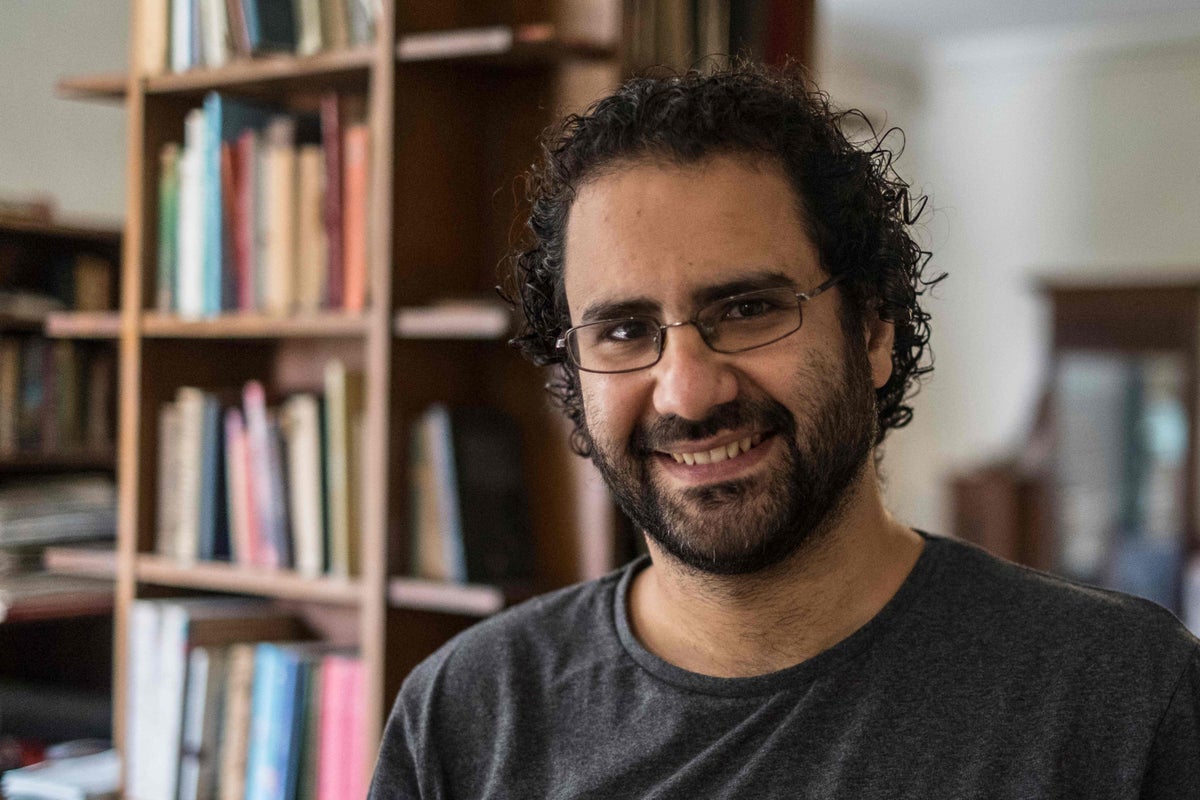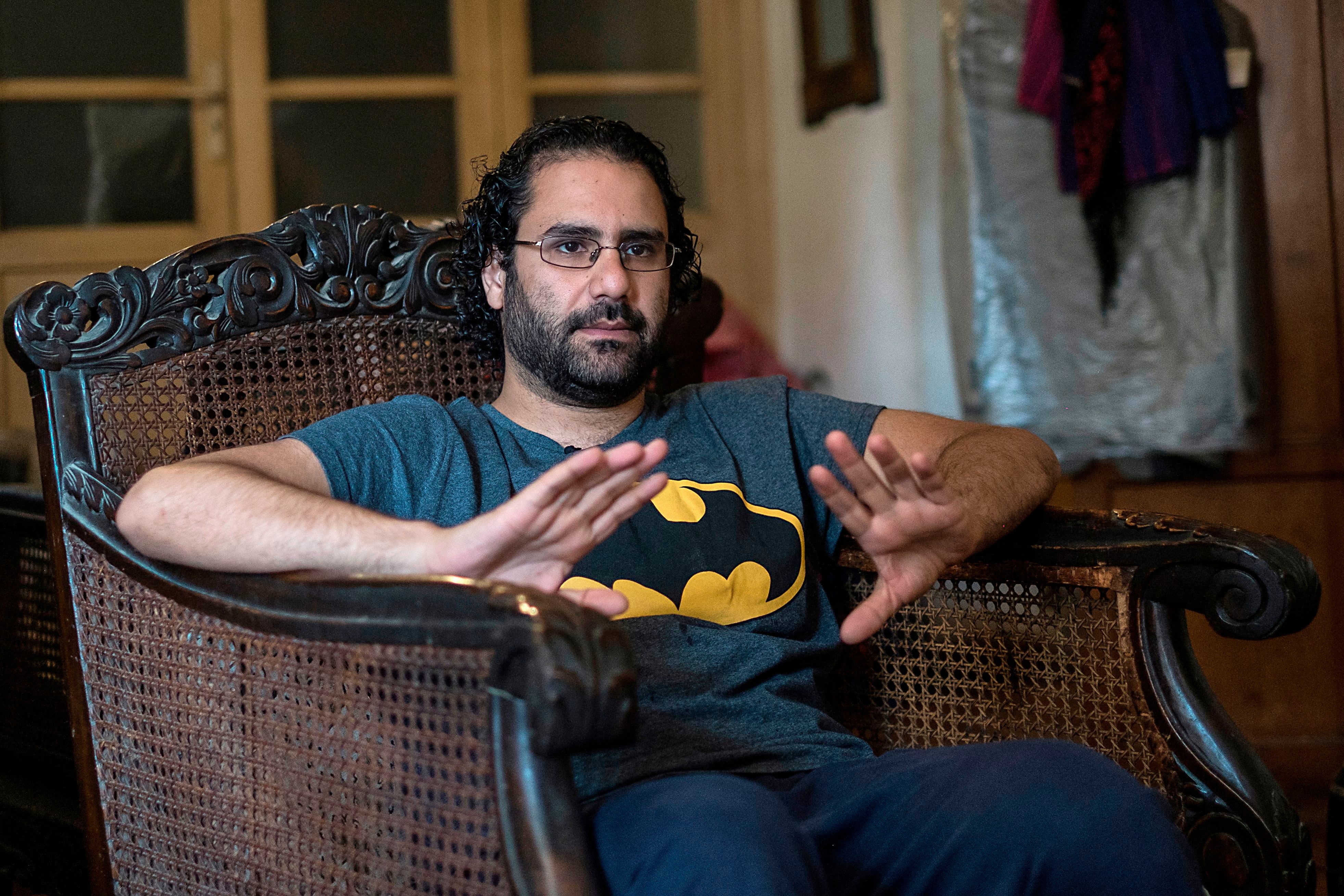
Dame Judi Dench, Stephen Fry and Carey Mulligan are among over two dozen celebrities who have joined forces in urging the British foreign secretary to immediately secure the release of a British citizen jailed in Egypt, as his family warn he may die after more than 70 days on hunger strike.
At least 25 actors, comedians and political thinkers from across the world penned the open letter, which is set to be sent to Liz Truss this week. It demanded she do more to help Alaa Abd el-Fattah, 40, a British-Egyptian activist, writer and father of a 10-year-old, who has spent most of the last decade in prison.
It is the latest development as pressure mounts on the foreign secretary, who has yet to publicly call for his release, acknowledge his hunger strike or meet the family.
This is despite the fact that Mr Abd el-Fattah’s case has been raised in parliament and highlighted in a recent bi-partisan resolution in Congress. Last month it was the focus of a cross-party letter signed by over 30 British MPs who warned doing nothing set a “dangerous precedent” for all Britons in Egypt.
Prominent figures who signed the letter to the Foreign, Commonwealth and Development Office (FCDO) include actors Olivia Coleman, Bill Nighy, Emma Thompson, Mark Ruffalo and Cynthia Nixon, authors Michael Ondaatje and Khaled Hosseini, as well as economist Yanis Varoufakis. It warned that Mr Abd el-Fattah’s ongoing hunger strike was “an act of peaceful resistance … [that] may be his last”.
“We call upon you to use all diplomatic power to leverage the importance of your strategic relationships with Egypt to secure his immediate release,” it read.
“We are appalled to see the inhumane treatment of Alaa, whom we consider a peer.”
An FCDO spokesperson told The Independent that the British government continues to raise his case at the highest levels of the Egyptian government.

“We are working urgently to secure consular access to Mr Abdel Fattah. We are also concerned by reports that he is on a sustained hunger strike,” the spokesperson said.
“The welfare of British nationals in detention remains a high priority,” the statement added.
The family of Mr Abd el-Fattah fear he may die after weeks on just water and rehydration salts, and more recently tea with milk, as he protests against Egypt’s decision to bar him the basic legal right to a visit from the British embassy.
His sister, Mona Seif, 36, also a British activist, visited her brother in jail just north of Cairo on Monday, and told The Independent she was so alarmed by how frail he was that she too has joined the hunger strike.
“Alaa has lost a lot of weight, he is very thin and looks frail, but his mind is still active,” said Ms Seif, who is also now only consuming water and rehydration salts after the prison visit.
“He is completely convinced he is not going to make it out of this prison alive,” she added.

The father and prominent rights defender was one of the most recognisable faces of Egypt’s 2011 revolution, which led to the toppling of long-term dictator Hosni Mubarak. He has been repeatedly targeted by the state, spending most of the last 10 years behind bars on trumped-up charges.
His latest five-year sentence comes after he shared a Facebook post that was critical of the regime of Egypt’s current president and ex-army chief, Abdel Fattah el-Sisi. He was also tortured. His younger sister, Sanaa Seif, also a British citizen, has also been intermittently jailed after she protested against his detention.
For the last three years, the Egyptian authorities have barred him from exercising, seeing the sun or even knowing the time. It was only after international uproar that he was moved from a maximum-security prison to a jail with better conditions, and was permitted a book for the first time in two and half years.
Ms Seif said that her brother was increasingly frustrated with the lack of movement from the UK.
“He truly believes that the British government is not moving for his release, for his safety, life or freedom or for anyone else in prison. Instead, they are more concerned about their joint investments and projects with the Egyptian government ahead of COP27” – which Cairo is hosting in November.
She said that the Egyptian government was violating their own laws in their poor treatment of him. The authorities deny Alaa is on a hunger strike and have blocked any visits from the embassy as well as his lawyer, who was barred from seeing his client on Thursday despite receiving a permit from Egypt’s chief prosecutor.

“They are blatantly trampling over the law at every possible opportunity. They are hell-bent on making an example of Alaa. Even if he dies in prison, they cannot be coerced into applying the law.”
She concluded that in these circumstances, she had to join her brother’s hunger strike.
“I am meeting officials in the UK, and speaking publicly – they cannot dismiss my hunger strike.”
Sarah Deshmukh, the chief executive of Amnesty International UK, has declared Mr Abd el-Fattah a “prisoner of conscience” and said that the UK needed to make Alaa’s case “an absolute priority”.
“It’s frankly bewildering that the UK has not yet even publicly called for Alaa’s release. Why not? What are they waiting for?” She said.
David Lammy, Ms Seif’s MP and the shadow FCDO secretary, said Mr Abd el-Fattah’s case is “dire and urgent”.
Mr Abd el-Fattah’s plight has brought to the foreground mounting frustration from British families over the FCDO’s failure to protect its citizens abroad.
On Tuesday, Mr Abd el-Fattah’s family and their MPs held a special event in Westminster together with multiple other families with loved ones locked up abroad to urge the UK government to take immediate action.
Among the speakers was Richard Ratcliffe, whose wife Nazanin was jailed in horrific conditions in Iran from 2016 until this year.
Also speaking was Leila Fritton, the daughter of British geologist Jim Fritton, who this month was sentenced to 15 years in jail in Iraq for “attempting to smuggle artefacts out of the country” – a charge he and his family vehemently deny.
Ahead of the event, his daughter Leila said the length of the jail sentence in such poor conditions for the 66-year-old “was tantamount to a death sentence”.

“We are not sure where he is, or what his conditions are. We are unable to communicate with him and we fear he is in grave danger while we process the appeal to fight this injustice,” she said.
“We are calling on the foreign secretary and junior ministers within the FCDO to communicate with us directly, to stop hiding,” she added.
Gurpreet Singh, the brother of Jagtar Singh Johal, who is imprisoned in India, also spoke.
Maya Foa, the joint executive director at Reprieve UK, said that Singh Johal has been detained without trial in India for almost five years for speaking out about historic abuses against the Sikh community.
“In that time, there have been four UK foreign secretaries,” she said, “but none have secured his release.”







